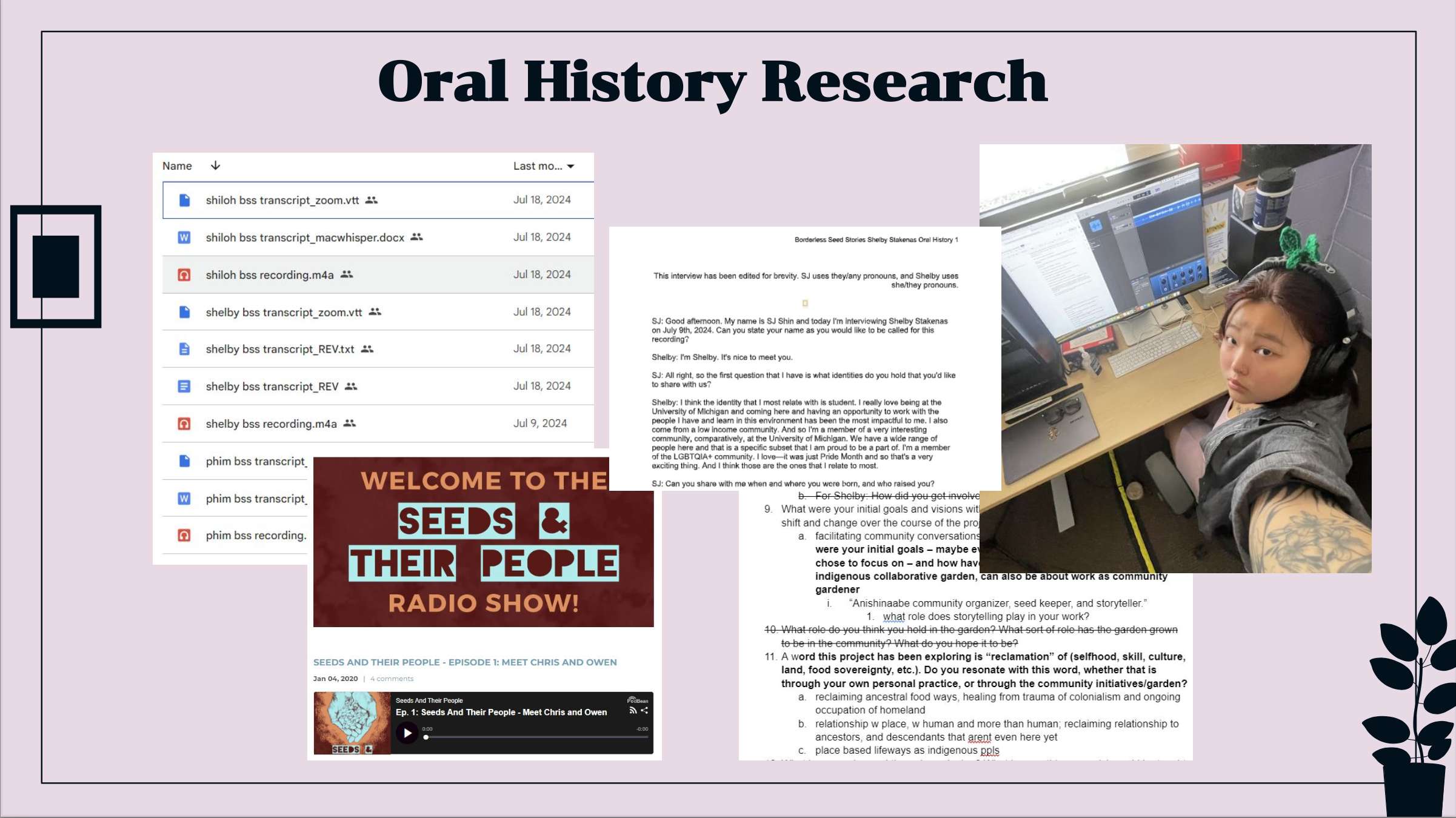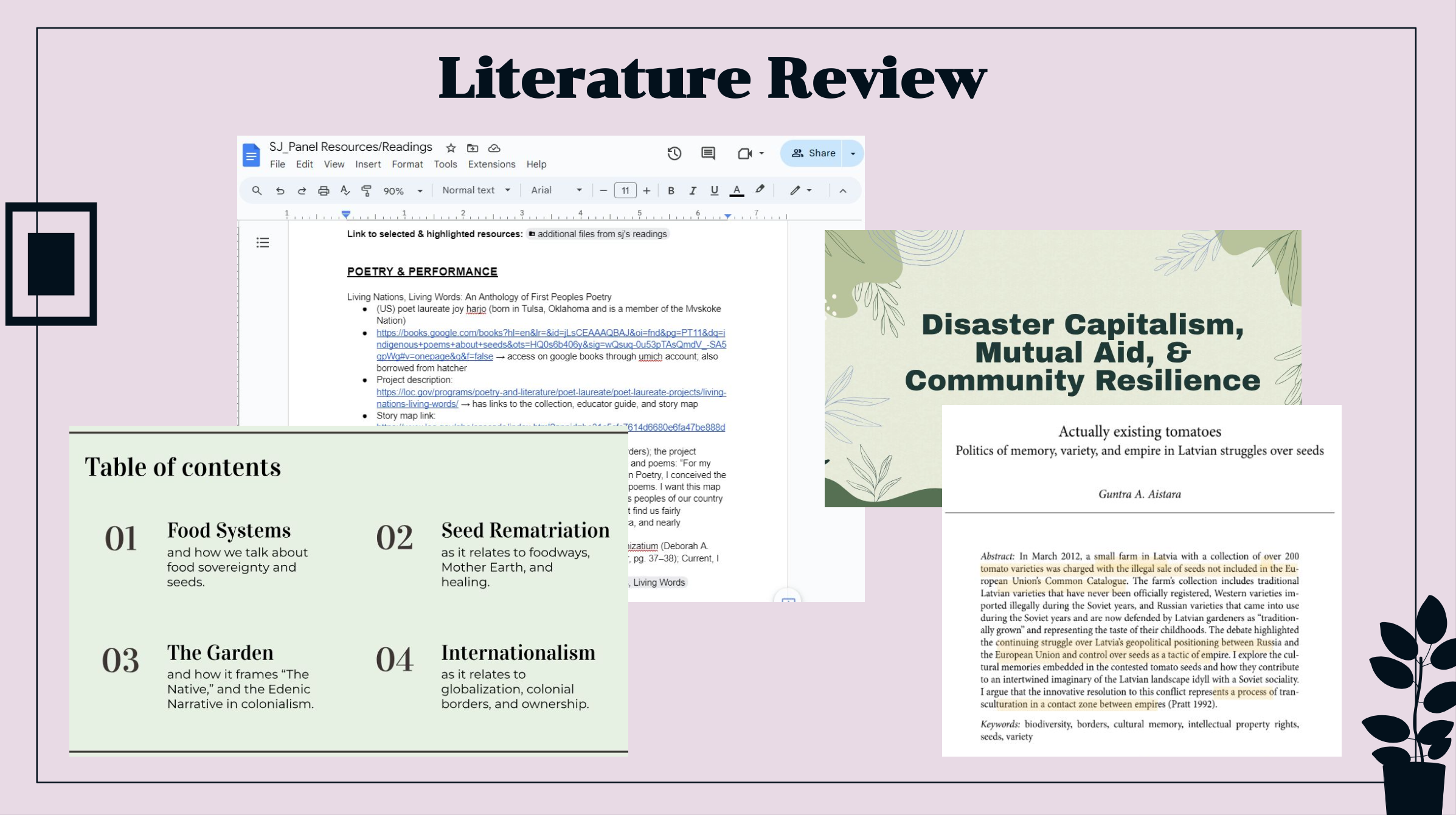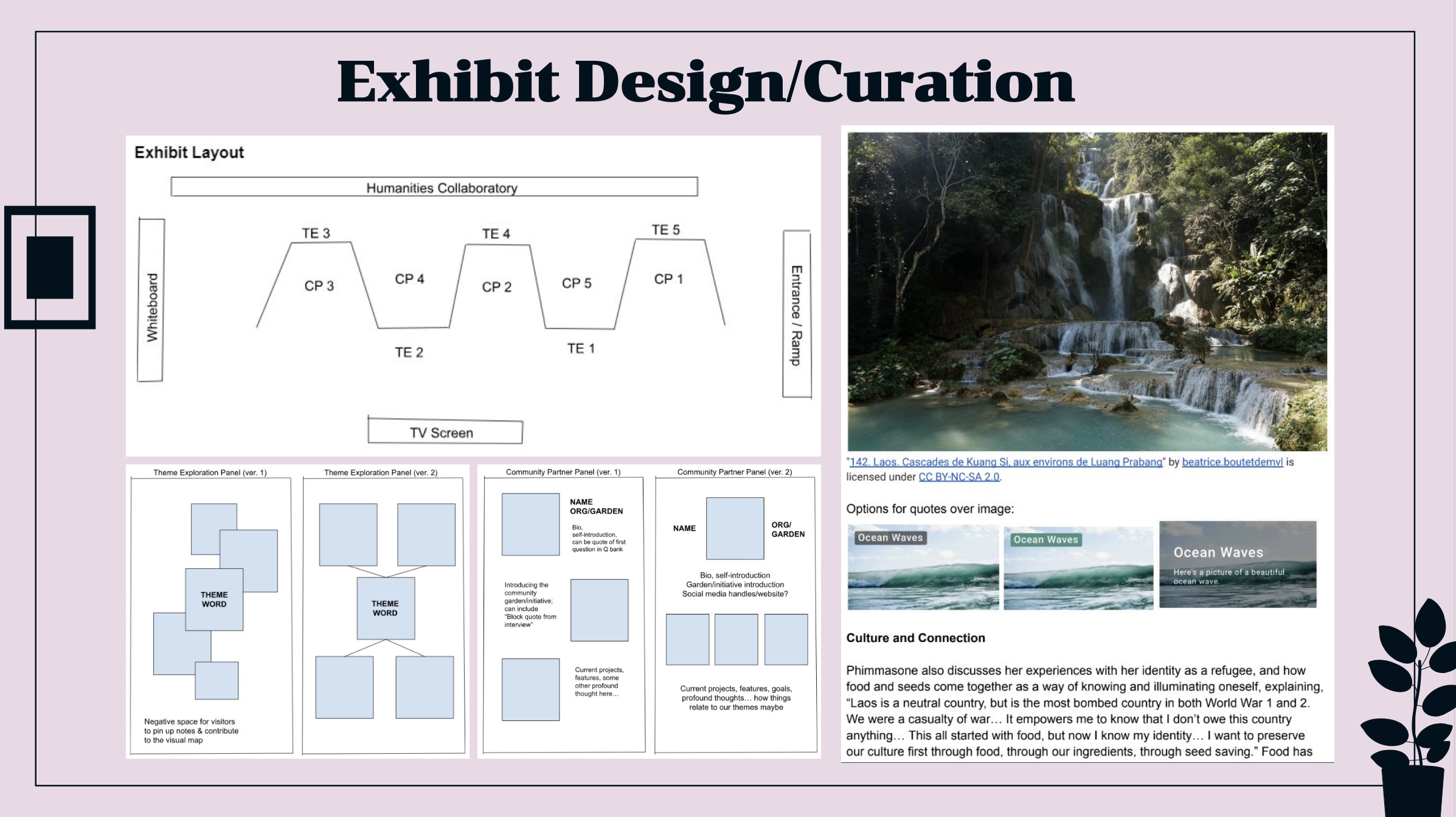Every year, I check on the library website to see upcoming projects in the Michigan Library Scholars (MLS) program and my interest is piqued, wanting to take part and learn from such a summer internship; and every year, I realize that I’ve missed the deadline by a day, a week, a month too late. This past academic year, though, after reading the description for the “Internationalizing the Seed Library” project, I put in a calendar event just to remind myself to apply, and finally sent in an application. Though this project started off as an initiative to connect with international community members and their stories related to seed, food, place and memory, it gradually transformed to reflect the concerns, interests, and values of the team and thus had been renamed, “Borderless Seed Stories” (BSS); an exploration of food and seed reclamation efforts across local Southeast Michigan garden communities.
If you asked me what I major in, I’d likely bounce around Arts and Ideas, Psychology, and Social Theory and Practice — but really, I’m interested in people and their stories, how we relate to one another, community organizing and public programming, and what liberatory practices can look like in different contexts. As an international student and a transplant, I often have a difficult time negotiating my place on this land. In a lot of ways, this ongoing process of reflection seeped into my MLS experience; as I continued to learn about land sovereignty and sustaining traditional lifeways through the LandBack movement in the United States and Palestinian liberation from the Zionist entity, the more I struggled to say centered in the initial goals of my MLS project. I kept wondering, what is happening locally? What sorts of initiatives, programs, and ongoing work is happening in Michigan that reflects the significance of seed in our communities? How can we situate our project amongst broader, global frames?
A lot of these questions were explored, though perhaps never fully answered, through meetings, initial conversations, interviews, and team debrief sessions over the course of this three month program. We started off our project by doing a series of readings to familiarize ourselves with seed stewardship, the IRB process, and ethical concerns regarding interviewing and engaging with community members. Though there was a great degree of communication and collaborative work between the BSS team of four — Caylen and Krystel, our mentors and supervisors, and Julian and I, the two co-interns — somewhere in the middle, we split our efforts into two teams: Krystel and Julian primarily focusing on the library's archives and special collections, and Caylen and I focusing on outreach, correspondence, and oral history interviews. I learned greatly about building relationships with community members, ethics in representation and storytelling, and yes, how to write emails and keep up with email threads. My work in this phase was greatly about reaching out to local gardeners and activists (and remaining tenacious despite several occasions of being ghosted or not responded to at all), coordinating times for initial conversations and recorded interviews, and revisiting our consent form in order to best work with the boundaries of our community partners. Eventually, I learned how to conduct oral history interviews over Zoom, transcribe these recordings, and do light editing of these audio files for concision and clarity.

Figure 1. Slide from my final presentation of a collage representing my oral history research process. The presentation template was created by Slidesgo, with icons from Flaticon and illustrations from Storyset.
At the same time, Julian and I did our own independent literature reviews and readings, exploring our personal interests and more deeply immersing ourselves into selected topics. Key themes that emerged from this totality of research (including the archives, special collections, and oral history collections) are: geopolitical and colonial borders, reclamation and rematriation, seed sharing, seed literacy, skills and community knowledge, and seed sovereignty. Not only did we sift through documentaries, movies, journal articles, podcast episodes, blog posts, poetry, we also presented teach-shares to our mentors, consolidating some of our findings into digestible 15-minute presentations. I was able to talk about disaster capitalism, particularly in Puerto Rico, and what community resilience can look like in the agroecology scene in San Juan and beyond; as well as on our project lexicon, particularly on food systems vs. relational foodways, seed rematriation, the concept of the Garden, and internationalism.

Figure 2. Slide from my final presentation of a collage representing my literature review process. The presentation template was created by Slidesgo, with icons from Flaticon and illustrations from Storyset.
As we began wrapping up our literature reviews and oral history research, it meant that we needed to begin with exhibit design, panel layouts, and texts to go into the exhibit. In many ways, this felt like the most grueling work. All these thoughts, considerations, and copious amounts of quotes and information somehow needed to fit within the limited panels of our exhibit space, and be legible to the dwindling attention span of our future visitors. Though Julian and I have had weekly body-doubling sessions (where we’d hop on a Zoom and coordinate our work, or sometimes even sit in silence as we read and complete independent tasks), and our team primarily functioned online with daily check-ins, only meeting up once a week on Wednesdays — the amount of Zoom sessions Julian and I had in the final two weeks, mostly focused on our work with timed breaks, was impressive, even to me. The last three months truly taught me how to set boundaries online, how to take breaks with heavy digital workloads, how to productively work with a team across multiple platforms, and how to feel comfortable with so many meetings being over Zoom.

Figure 3. Slide from my final presentation of a collage representing my exhibit design/curation process. The presentation template was created by Slidesgo, with icons from Flaticon and illustrations from Storyset.
I don’t think I could have ever imagined what this internship has become for me. To be able to have a sustained voice and impact on a project has been incredibly rewarding, and to be able to share space with not only my dedicated team members, but also the library staff members who have provided guidance and their experience, as well as incredible community members who have become an integral part of this project, has been such an amazing experience, one that I am grateful to have as I enter my senior year. I have always been one to flip flop between ideas, enamored by emerging initiatives, wanting to be part of something, everything, and trying to make the most of the time I am privileged to have on this campus. Borderless Seed Stories, however, has taught me to slow down, to enjoy and honor the work that we do, and to find new ways in connecting with other people and our earth. On a personal level, I’ve been thinking a lot about rice! And thinking about my ancestors who have planted these seeds, how these memories persist across generations, how I yearn for them despite being so far away from home. I am grateful to this project, the scholars and writers I’ve explored, and the stories of our community contributors for reconnecting me to this feeling.
I have been asking myself, “Where do I go from here?” With the project wrapping up and the uncertainty of my future involvement — and my impending graduation! — I am at a loss for what to do next. I’ve gotten a closer look at what librarianship, particularly nestled within a university, can look like; I’ve also learned about project management and community engagement, and how reciprocal relationships take time, and projects can span months, years and beyond. But the more I progress further into my emerging adulthood, the less I am certain of what I want to do “when I grow up.” What I am continuing to learn, however, is to stay rooted in community and lead with love and my values — and I suppose BSS has further established this for me. I hope that I can take this learning experience into my future endeavors, and stay connected to this project after this program ends.